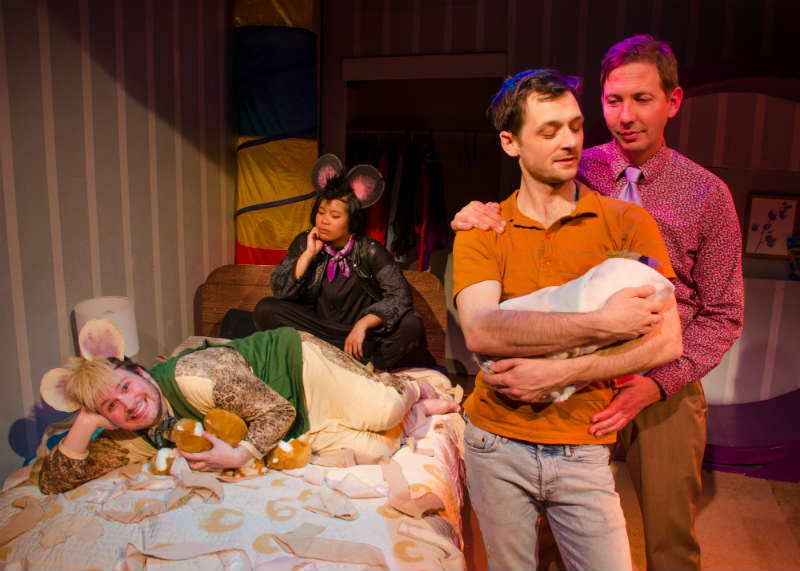A giant critter trail, hamster wheel and water feeder blend in with the furnishings of a typical apartment on the stage of Dan Giles’ new comedy “Breeders,” running through April 29 at San Francisco’s FaultLine Theater. It tells the parallel narratives of two couples — one human, one hamster. Dean, a former potter and soon-to-be stay-at-home dad, becomes increasingly anxious about the child he will soon adopt with his boyfriend Mikey, a finance worker. Dean and Mikey’s worries lead to increasing conflict, as each man becomes frustrated with the other’s lack of emotional care. Their relationship strife is mirrored inside the cage of the hamsters they are temporarily babysitting. Jason, a love-struck, tirelessly upbeat and occasionally existential hamster, lusts for Tyson, originally thought to be a male hamster by Dean and Mikey. But as Tyson’s stomach begins to grow, it becomes clear she’s female and pregnant. Her changing hormones make Tyson increasingly irritated with Jason, and their relationship also becomes defined by conflict. Both narratives, cleverly constructed by Giles and adeptly interwoven by director Adam Odsess-Rubin, explore the complexities of love, parenthood and anticipation.
Audience members are encouraged to bring their drinks into the theater, contributing to a laid back atmosphere. The small, intimate theater brings the audience close to the action, cultivating a space not only for spectatorship, but engaged thinking.
The play’s action is primarily contained to Dean and Mikey’s apartment and the hamster cage that rests inside its walls. Intense arguments between the two men are often broken up by distractions from the cage — aggressive humping, fights, even a gouged eye. The hamsters offer an interesting frame that reflects back on Dean and Mikey. Both couples must navigate the ways their relationship will change with the additions of children in the house. But the concerns range widely. For example, Dean ponders if he is ready for parenthood. Mikey wonders if Dean is still committed to the relationship. Jason questions if he should eat his children. Tyson broods on how her shifting identity from lover to mother will change her relationship. All these narratives revolve around issues of preservation and change, loss and renewal. They remind us that whether straight or queer, human or animal, family drama and the stress of parenthood are universal struggles. At a time when tolerance, understanding and love are more critical than ever, Giles should be commended for reminding us of the things we share with one another.
At times, “Breeders” doesn’t deliver on the promise of its concept. Giles relies heavily on physical humor, interjecting scenes of anthropomorphic hamsters running on human-sized wheels or secret Prowler dates licking human toes, but the script is not quite as witty. Consequently, at times there is an odd dissonance between the levity of the play’s physicality and the heaviness of its dialogue. But at moments when physicality and conversation work in harmony, “Breeders” both amuses and disturbs us in innovative ways, asking poignant questions about our fears and desires as caregivers. Arguments about Neil Patrick Harris or couple disputes ending with the age-old “are you coming to bed?” help comfort the audience with familiarity in the otherwise bizarre and occasionally absurdist world that Giles conjures. The play struggles to get us to suspend our disbelief. When listening to musings on hamster heaven, this challenge can seem great, even impossible. But this challenge is also the show’s greatest strength; it always feels unconventional, fresh and urgent. The play doesn’t always succeed in making us believe but usually delivers in making us laugh.
Contact Alessandro R.L. Hall at ahall2 ‘at’ stanford.edu
